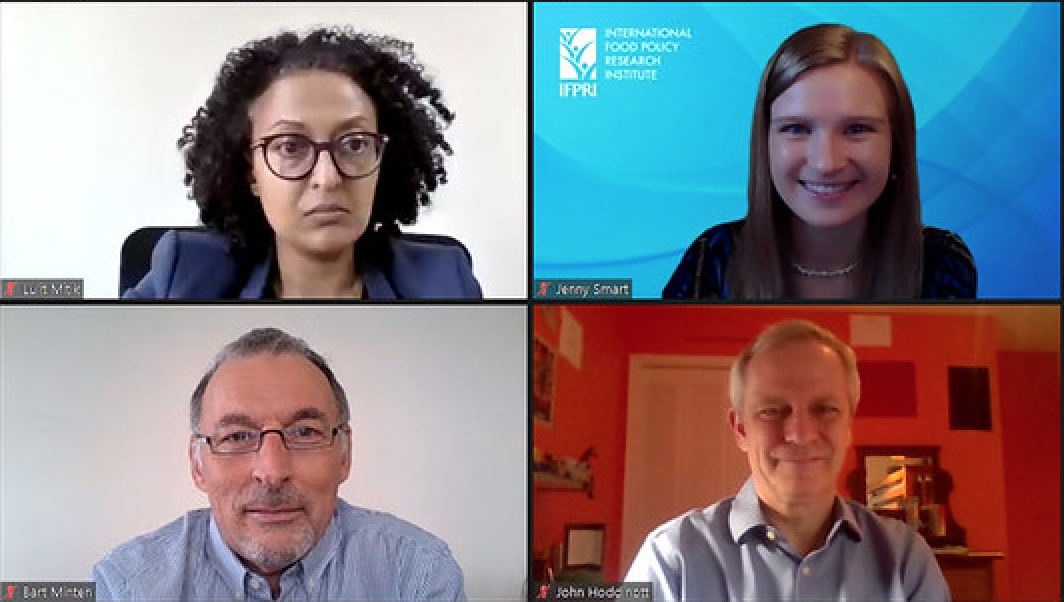Over the past two decades, Ethiopia’s economy has seen wide-ranging changes. Agricultural production has rapidly increased, urban populations have tripled, road infrastructure has expanded, and rural poverty rates have dropped.
Ethiopia’s Agrifood System: Past Trends, Present Challenges, and Future Scenarios, a new book edited by IFPRI’s Paul Dorosh and Bart Minten, analyzes these changes and looks forward, focusing on Ethiopia’s agriculture sector and its place in the country’s evolving economy. A Sept. 22 virtual book launch explored those themes—and the COVID-19 pandemic’s effects on Ethiopia’s poverty and agricultural development programs.
One focus of the event was the Productive Safety Net Program (PSNP), a major part of Ethiopia’s poverty reduction efforts. The program supports Ethiopian households in rural areas during crises such as droughts, and now COVID-19. The PSNP has, on average, about 8 million beneficiaries per year, who receive support in the forms of public works jobs or direct payments.
In many areas, the PSNP has been measurably successful since it was established in 2005. At the household level, the program has improved dietary diversity and calorie availability. And it has reduced the food gap—the number of months per year that households are unable to meet their food needs—by one month per every 500 Birr ($13.60) of transfers. Perhaps most notably, beneficiaries have improved resilience: They are able to recover from economic shocks, which often lead to decreased food security, more quickly.
The program is not without its challenges, however. “Child nutritional outcomes were not significantly affected by the PSNP, and diet quality of children remains poor,” said IFPRI Senior Research Fellow Alemayehu Seyoum Taffesse. “Although the PSNP is successful in many ways, considerable food insecurity and vulnerability remains in Ethiopia, and this has been shown by the current crisis, COVID-19.”
“If nothing else, COVID-19 reinforced the value of having a safety net program in place before a crisis struck,” added John F. Hoddinott, H.E Babcock Professor of Food and Nutrition Economics at Cornell University. While households receiving PSNP transfers saw smaller reductions in food security, he noted, “to say a program works does not necessarily mean that it always works well, nor does it imply that there’s not always room for improvement.” Some avenues for improvement discussed at the event included expanding PSNP coverage. The program has seen less success in Ethiopia’s lowlands than it has in the highlands, and it does not provide equally widespread support to urban areas. “Arguably COVID is the first shock which has had direct impacts both in rural and urban areas, and that reinforced the importance of an urban poverty alleviation strategy moving forward,” Hoddinott concluded.
IFPRI Senior Research Analyst Jenny Smart, the moderator, asked each panelist: “What were the priorities for agricultural development and poverty alleviation in Ethiopia before COVID-19, and how have these changed?”
Ethiopian Economics Association CEO Lulit Mitik Beyene listed economic transformation, production, productivity, and food self-sufficiency as enduring priorities, citing ongoing public investments in rural roads, improved seeds, extension services, and rural finance. But she also stressed that the approaches to these priorities are in flux.
“I think that COVID-19 coincides with important reforms and changes in our country,” Beyene said. “Now, whether it is because of the COVID or not, it’s not obvious yet. But notions like national and global value chains have become very important … The role of the private sector is being put forward in terms of agricultural investments … Affordability has also become an important issue … how can food become affordable but also nutritious?”
Nemera Gebeyehu Mamo, Deputy Commissioner of Ethiopia’s Planning and Development Commission, emphasized growth: “If anything, the COVID situation has necessitated the importance of substantial agricultural growth for Ethiopia’s aspirations to sustain the broad-based growth that has been achieved over the past two, three decades.”
While the agricultural sector’s share of Ethiopia’s total production output is shrinking, it remains the largest sector. More than 70% of the labor force works in the agricultural sector, and agricultural exports make up the dominant share of export earnings. “For Ethiopia to achieve structural economic transformation … the agricultural sector remains to be the backbone in terms of the potential for output growth and also … job creation potential,” Mamo said.
However, the area of land available for expanding farming is small, and shrinking. Croplands in Ethiopia’s highlands have limited potential to expand. In order to sustain and accelerate the agricultural sector’s rate of growth, Ethiopia must find ways to increase production and productivity that don’t require more land. Among the possibilities discussed were larger scale commercialization, modernizing and mechanizing farms, and orienting the market for small-scale farming.
The government must also step up, Mamo said: “Given the potential and the scale of the challenges we face in the agricultural sector, has the government really invested enough?”
Ultimately, the questions around COVID-19’s impact on Ethiopia’s economy and agriculture sector remain only partially answered. The economy was poised for transformation before the pandemic; the pandemic adds to the list of complicating factors. Dominique Davoux of the European Union Delegation to Ethiopia suggested looking at COVID-19 as an opportunity to refocus the country’s existing public investment in agriculture and pro-poor programs. But in the meantime, the situation is still evolving. When asked about the pandemic’s effect on Ethiopia’s exports, Beyene’s answer summarized the present moment succinctly: “Our assumptions are … evolving. Uncertainty is really the constant.”
Timothy Karoff is an IFPRI Communications Intern.







